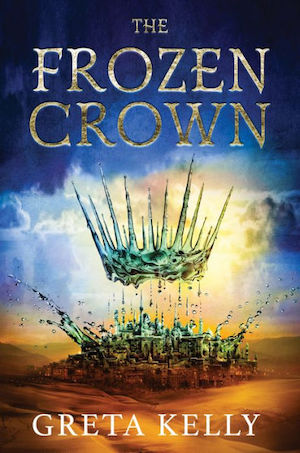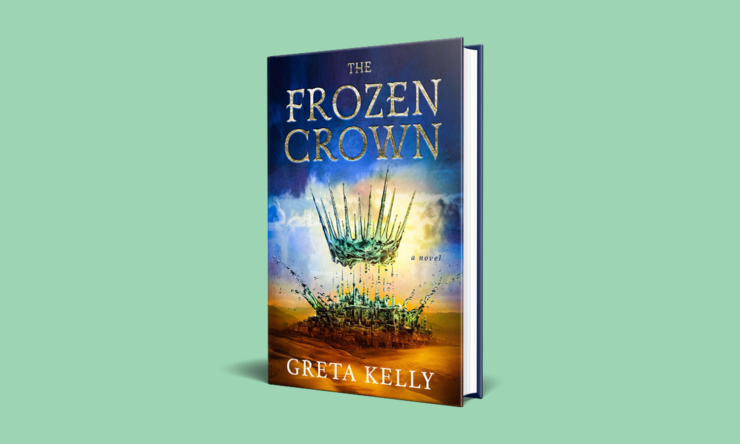The Frozen Crown is American author Greta Kelly’s debut novel. In this fantasy novel, the heir to an embattled kingdom travels to the court of a great empire, ruled by her godfather, to beg for military aid.
Askia is the legitimate queen of Seravesh, but the expansionary forces of the Roven empire have put her cousin on the throne and proceeded to terrorise her country in order to compel her surrender. She’s taken her last loyal legion and fled, in the hopes that a personal appeal to the emperor of Vishir—in whose realm her parents met their death, and where she experienced torture at the hands of an extreme anti-magic sect in her youth, who were attempting to prove that she was a witch—will have the effect she desires.
She has few allies in Vishir, save the emperor’s politically isolated second son, Iskander, and she hides the secret of her magic close. And she is surrounded by potential enemies, for Roven has some influence at court in Vishir. If she is to live and regain her throne, she may have to bargain for an army with a marriage, while surviving treachery and magic. Roven’s emperor wants her not just for her rank, but for the magic in her blood, which may help him achieve a mysterious goal.
I will confess I struggled with The Frozen Crown. It’s a readable novel, rollicking along at the prose level with a decent voice and a relatively appealing, if not enormously competent, main character. But to its misfortune, and my ultimate dissatisfaction, many elements of its construction and worldbuilding seem shallow and contrived, and others are illogical—or at least, poorly explained, so that their logic is less than apparent. I don’t wish to leave you with the impression that The Frozen Crown is a terrible book: it’s entertaining provided one doesn’t probe too deeply. But it is an un-thoughtful book.
Buy the Book


The Frozen Crown
Consider Askia. She doesn’t want to play politics. She wants an army. She says this, or words to that effect, repeatedly—including to her allies at the court of Vishir. Yet she’s been heir to her country for several years, and surely knows that politics are part of life for any ruler. She’s annoyed at the patriarchy in Vishir—a country where she has lived before, and whose sensibilities she might have previously encountered—and at the advice and interference of the emperor’s senior wife and her waiting woman, who try to tell her how to present herself in order to outrage fewer sensibilities. Her reaction is—or so it seems to me—disproportionately offended.
All the significant men in the novel appear to either want to marry or kill her. The head of her personal guard; Iskander, the emperor’s son; the emperor himself: they want marriage, or at least sex. This, coupled with the fact that she is established as a magically talented character who is also good at fighting (and with a tragic past) almost inclines me in invoke the spectre of Mary Sue, but honestly, I love a good Mary Sue as long as I find her world believable and the coincidences forgivable. Who doesn’t like well-done wish-fulfilment?
But the world here is too narrow, too confined to the concerns of essentially one family, without thought for the web of economic, social, and logistical relationships that bind nations connected by a sea. There is a history of travel and communication (seen in the person of the protagonist, but implicitly present with the existence of a navigable sea) and in the pages of the novel we’re told that letters go back and forth across the sea with relative ease. So where, in all this, is the merchant community whose flow of trade goods, whose connections and influence, has been affected by war? Where is the trickle of refugees wealthy enough and well-connected enough to flee this far from the ongoing wars? Where are the expatriate aristocrats in Vishir—surely someone has married out, or has a distant cousin in Seravesh of whom they hope for news? Where in any of this is a sense of Askia’s community, her constituency, the people she is determined to rule, as individuals? Did she leave no one behind her — not a servant or a tutor or a lover or a friend—who she hopes to see again, or to protect?
A country is a notional thing: even in this modern world, we often find our first loyalties are to people or communities. In an aristocratic world such as Kelly depicts, ties of personal loyalty ought to weigh more heavily on the characters. And yet I cannot see that they do. There seems no world beyond the immediate horizon of Askia’s gaze, no past friends or communities, not even the possibility of them. And that makes The Frozen Crown seem shallow indeed.
If one disregards these complaints—and the peculiar coincidences of logic—it’s a book with a good voice, an easy pace, and a soap opera’s complement of family and romantic drama, intrigue, and betrayal. I read it through to the end, which means it didn’t bore. But I don’t really have it in me to offer it more heartfelt praise, especially as its conclusion leans more to the mad wizard shenanigans than court intrigue and armies end of things—and the mad wizard shenanigans were not its strongest point of appeal.
Oh, and since readers of my column sometimes like to know: no, it’s not at all queer. Not even a little bit.
The Frozen Crown is available from Harper Voyager.
Read an excerpt here.
Liz Bourke is a cranky queer person who reads books. She holds a Ph.D in Classics from Trinity College, Dublin. Her first book, Sleeping With Monsters, a collection of reviews and criticism, was published in 2017 by Aqueduct Press. It was a finalist for the 2018 Locus Awards and was nominated for a 2018 Hugo Award in Best Related Work. She was a finalist for the inaugural 2020 Ignyte Critic Award, and has also been a finalist for the BSFA nonfiction award. Find her on Twitter. She supports the work of the Irish Refugee Council, the Transgender Equality Network Ireland, and the Abortion Rights Campaign.










